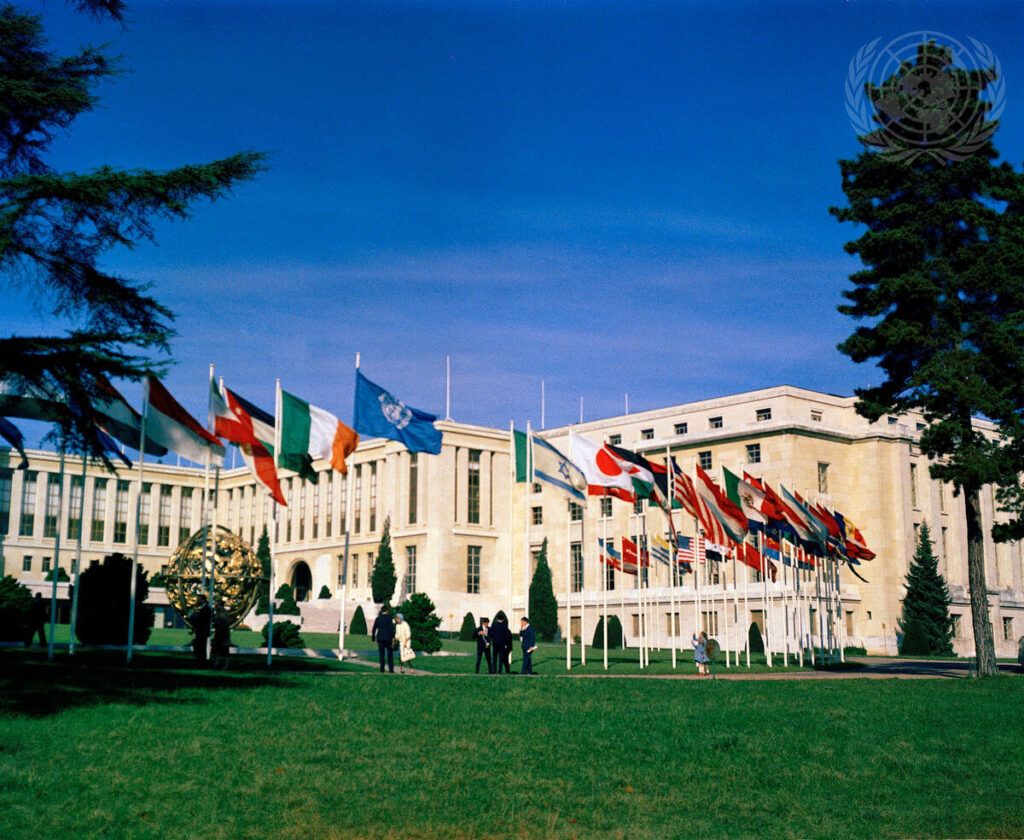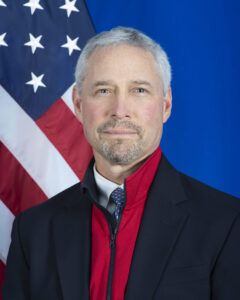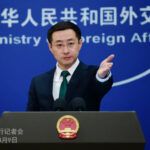Interview: US diplomat Adam Scheinman on nonproliferation, arms control, and the NPT
By John Mecklin | July 22, 2024
 The Preparatory Committee for the 2026 NPT Review Conference will hold its second session from July 22 to August 2 at the Palais des Nations in Geneva, Switzerland. (UN Photo)
The Preparatory Committee for the 2026 NPT Review Conference will hold its second session from July 22 to August 2 at the Palais des Nations in Geneva, Switzerland. (UN Photo)
With a tense international security situation as backdrop, representatives of the countries belonging to the Nuclear Non-Proliferation Treaty, or NPT, gather this week in Geneva, Switzerland to continue setting the table for the treaty’s 2026 Review Conference. The Preparatory Committee meeting that begins today is the second of three ahead of the 2026 conference. NPT member countries have failed to agree on consensus statements at each of the last two Review Conferences, and the current security environment—in which the United States, Russia, and China are modernizing their nuclear arsenals, arms control efforts are minimal, and a Russia-NATO standoff on Ukraine continues—bodes ill for future agreement.
Last week, I spoke with Ambassador Adam Scheinman, who oversees US diplomacy around the NPT, about the upcoming Preparatory Committee meeting, the NPT Review Conference to follow, and US nonproliferation and arms control efforts more generally. The following interview has been edited and condensed for clarity.

John Mecklin: I’m probably going to ask one or two questions that seem very elementary to you. But your title is Special Representative of the President for Nuclear Nonproliferation in the Bureau of International Security and Nonproliferation, which is part of the State Department. Most people will have no idea what that means. Why don’t you just explain for a minute, what is it that you do?
Adam Scheinman: I recognize it’s a fancy title. But in our system, this position is primarily responsible for overseeing and managing our diplomacy centered around the Nuclear Non-Proliferation Treaty. We’re actually quite proud of the fact that we have someone in this position; I think we are the only country in the world that has a dedicated representative at that level, dealing with the NPT.
Mecklin: There’s an NPT Preparatory Committee meeting coming up. And it’s one of three intersessional meetings between NPT conferences. What do you expect to happen there? There’s been a lot of not very much happening out of NPT meetings. Do you expect some sort of progress toward some kind of agreement at the next NPT conference?
Scheinman: The way the NPT review process is set up, we have a series of preparatory meetings, normally three of them in advance of the Review Conference itself, which meets every five years. And the goal of the Review Conference is to negotiate a final document, one that covers the breadth of the NPT, across what we call its three pillars: one dealing with nuclear disarmament; one dealing with nuclear nonproliferation, in other words, preventing the spread of nuclear weapons to additional states; and the third pillar dealing with peaceful uses of nuclear energy.
So, the central negotiation is at the Review Conference, and at the Preparatory Committee meetings, including the one that we have coming up in a couple of weeks now, we use that time to try to achieve an understanding of national positions, of proposals that countries or groups of countries want to bring to the Review Conference. And, you know, if possible, try to achieve some convergence on a set of actions that might be endorsed at the Review Conference. So, the preparatory meetings themselves, are, as the title would suggest, preliminary in a sense, because there is no document to negotiate. But this is the time to lay out our individual priorities and to start thinking through what the aspects of an agreed outcome document might look like.
Mecklin: So, I’ll ask what I think of as the money question here: The nonnuclear weapons countries are concerned that the NPT is going nowhere toward disarmament. And in fact, all three major nuclear countries have nuclear modernization programs underway. What could possibly be reached in the way of an agreement on Article VI,[1] given nuclear modernization and what appears to be a new nuclear arms race underway?
Scheinman: Yeah, well, I think it’s important to set out that the NPT itself doesn’t obligate the states that have nuclear weapons to achieve nuclear disarmament. It certainly obligates them to take steps in that direction. And historically I think there’s actually been significant success in that regard. We ended the nuclear arms race of the Cold War period, clearly. We pulled down the numbers of nuclear weapons in the US stockpile by close to 85 to 90 percent from the Cold War highs. The Russians in the early post-Cold War period also brought their total stockpiles way down. We negotiated a Comprehensive Test Ban Treaty, which has yet to enter force. But we’re not seeing nuclear testing around the world with one exception of North Korea. Of course, the United States and Russia negotiated follow on arms control treaties, including the New START treaty, which also pulled our deployed strategic weapons down by a third.
So, there’s actually a pretty strong track record of success toward meeting NPT goals. Where we are today is more challenging; we’re in a more challenging security environment. Obviously, Russia’s illegal war against Ukraine and its unbelievably irresponsible nuclear behaviors are of concern not just to the United States, but to allies and partners, and frankly, should be of concern to nations around the world. China is rapidly building up its nuclear forces, for purposes that we can’t quite discern, because China doesn’t really want to talk about it with us, bilaterally. So, there’s an agenda in front of us.
And we will talk to NPT parties about possibilities for the next, let’s say, three-to-five-year time frame, and that includes preserving what we have—that really is essential. We need to preserve what we have, which means for example that Russia needs to return to implementation of the New START Treaty. This is the last remaining bilateral arms control treaty, it expires in two years, and we’d like to preserve it as a framework for nuclear stability into the future. So, we have offered to conduct discussions with Russia on what a framework for arms control or strategic stability might look like after 2026 [when the treaty expires]. And so far, we’ve received no response other than we’ll talk, if you, in effect, surrender Ukraine to Russian imperial control, which of course is not going to happen. So, preserving the New START treaty is something that all states parties should be willing to get behind.
We are concerned about arms racing into the future. And there’s a treaty that has been sitting fallow for decades now—or a treaty idea—which is a Fissile Material Cutoff Treaty. And perhaps it didn’t look as urgent in the previous 20 years as it might today. But there is urgency associated with it, because if China is going to continue on this massive expansion of its nuclear stockpile, if Russia is thinking about further diversifying or expanding its nuclear weapons, we may face a nuclear arms race in the future. And a Fissile Material Cutoff Treaty—a treaty that would end the production of the materials needed for nuclear weapons, put a quantitative cap on stockpile growth—would provide a means to address that potential future of arms racing. So again, that too, should be something that countries are very concerned about and ought to get behind. And then a third area is focusing on the fundamentals of stability and the ways in which nuclear arms racing or, God forbid, a nuclear conflict might appear somewhere in the world, which is through a set of measures that we call risk reduction. And that really relates to the confidence-building types of arrangements, the dialogues, and the various mechanisms we have to avoid conflicts that might escalate and find ways to keep escalation pressures under control.
All of that, I think, is a pretty solid agenda for future work in the NPT. And many states parties within the treaty would see those as good outcomes, if they could be produced. Others may be more interested in seeing total nuclear disarmament, but we just don’t see that as a feasible prospect in the near term or even across any planning horizon that we see.
Mecklin: I don’t want to seem cynical or anything, but the Fissile Material Cutoff Treaty has been a dead letter for decades. You really think there’s a possibility that that’s going to be seriously considered? I don’t think it is.
Scheinman: I think it is seriously considered. And I think if it were possible to frame a negotiation in the Conference on Disarmament, the vast majority of countries would get behind it. To this point, however, Pakistan, which is a member of the Conference on Disarmament, has made clear, for a variety of reasons that the Pakistani government can speak to, is not prepared to end production of fissile material, to cap its nuclear stockpile.
But I would say two things: One, is, if we don’t demand it, those that are less interested in pursuing this treaty will feel no pressure to engage. So there needs to be a movement to increase the demand signal for an FMCT. The second thing I’d say is, in some respects, it may have been may have been seen as a dead letter because stockpiles weren’t increasing very intensively. There was some activity that North Korea had undertaken to build out its nuclear stockpile. China was sitting on a nuclear stockpile for many years that was relatively small and stable in size. The other four NPT nuclear weapon states had declared a moratorium on production of fissile material for nuclear weapons. So, in that respect, the problem perhaps was seen as more manageable or less urgent. I think that’s changed with China’s decision that it needs many, many more nuclear weapons and the fissile material to go into those nuclear weapons. And so the situation has changed, fundamentally, even over the last three, four, or five years.
Mecklin: I would be remiss if I didn’t bring up Iran, since that’s an obvious proliferation problem, a possible nuclear weapons state. How much will the situation in Iran be discussed at this preparatory committee meeting or in regard to the NPT as a whole? Is that something that’s a completely separate thing? Or will some attempt to refashion a way of dealing with Iran happen as part of the NPT process?
Scheinman: It’s very much central to the future of the NPT. The question of whether there may be a diplomatic track that could be revived, since the JCPOA [Joint Comprehensive Plan of Action or Iran nuclear deal] is no longer functioning, I think is a separate question from what the NPT process might achieve.
The fact is that Iran has been steadily building out its nuclear uranium-enrichment infrastructure and has been under [International Atomic Energy Agency] investigation for safeguards compliance issues dating back decades now. So naturally, NPT States parties see the potential threat of a future Iranian nuclear weapon, but also recognize that Iran has obligations that it accepted when it came into the NPT to ensure that all of its nuclear programs are under IAEA safeguards and are for exclusively peaceful uses. And given where Iran is today in terms of expanding its centrifuges for uranium enrichment and enriching material to highly enriched levels that serve no civilian or commercial purpose—well, then, it has to answer the IAEA’s questions. And so we do expect to continue to talk about the serious challenges to the NPT [involving] countries that are not meeting their legal obligations. And we have seen across NPT meetings that there’s wide support for the idea that we have to close this chapter with Iran returning to full cooperation with the IAEA.
Mecklin: I guess now I’ll move on to one last general question that should leave you plenty of room to run. You said that the landscape was challenging for the NPT. It seems historically challenging. Arms control has largely collapsed, with only one major treaty left and the Russians talking like they’re going to leave it. There’s a war in Ukraine. There’s the Iran situation and the North Korea situation. And other countries have latent abilities—South Korea and Japan could build nuclear weapons if they decide to. It seems like an enormously challenging environment. I just want to hear you talk about how the United States hopes to change that reality.
Scheinman: Yeah, it’s a really important question. I think the conditions are worse than at any time in the NPT’s history. During the 1960s and the 1970s, one of the major benefits that helped drive the NPT was that the United States and the Soviet Union agreed that the NPT is a treaty that the world needs. And our teams together helped negotiate the treaty. And it was obviously a hallmark of-East West detente at the time and that continued right on through the post-Cold War period.
Now, obviously, Putin has a different idea about nuclear weapons, how to exercise deterrence and what role arms control might play in that connection. And therefore, we’re dealing with a very different country, and a very different leadership in Moscow than we knew previously. So, I think there’s a fundamental question here that bears on the NPT, which is whether the major powers—and in this case, I’m referring really to the United States, Russia, and China—continue to believe that an NPT that is functioning and enforced is a good thing. I suspect that we agree that more nuclear proliferation is not a good thing. And it’s also the case that if there is new proliferation in the world, whether that’s Iran or another country, it’s more likely to be closer to Russia or China than to the United States. So, this is something they should care about, and I think they do care about.
The question is, what are we doing to bring restraint and control back into the dialogue through countries that don’t have nuclear weapons and that face nuclear armed adversaries. You mentioned, Japan and South Korea, but frankly you could apply this to NATO member states that for the first time since World War II are facing a war in Europe. Are they sufficiently assured that their security can be guaranteed if threatened with nuclear weapons, whether from Russia in Europe or from China in Asia? So we ought to be thinking hard—all of us, not just the three powers, but all the NPT member states should be thinking really hard about what is needed to prevent nuclear war in the 21st century. And it’s a concern that I agree is probably more serious today than really any point since the Cuban Missile Crisis, which took place before I was born.
So, in terms of putting more energy and effort into formal arms control arrangements, into dialogues on strategic stability, into understanding each other and how we think about nuclear weapons—and hopefully that’s a shared concept that nuclear deterrence should be for purposes of defense, and not for intimidation or for blackmail—and into work on agreed codes of conduct to avoid conflicts spilling over into the nuclear realm, we’re for all of that, as every NPT party should be. If we can all come to the NPT process, in this very challenging security environment, with the idea that we have an NPT that has functioned and can continue to function to prevent nuclear war, I think there’s a greater possibility that we’ll reach some sort of set of agreed recommendations when we get to the 2026 NPT Review Conference.
Notes
[1] The text of the NPT’s Article VI reads as follows: Each of the Parties to the Treaty undertakes to pursue negotiations in good faith on effective measures relating to cessation of the nuclear arms race at an early date and to nuclear disarmament, and on a treaty on general and complete disarmament under strict and effective international control.
Together, we make the world safer.
The Bulletin elevates expert voices above the noise. But as an independent nonprofit organization, our operations depend on the support of readers like you. Help us continue to deliver quality journalism that holds leaders accountable. Your support of our work at any level is important. In return, we promise our coverage will be understandable, influential, vigilant, solution-oriented, and fair-minded. Together we can make a difference.
Keywords: NPT, NPT Review Conference, Non-Proliferation Treaty, Preparatory Committee
Topics: Analysis, Nuclear Energy, Nuclear Risk, Nuclear Weapons














Thank you to John Mecklin for providing the text for Article VI. It makes clear that we should worry when a prominent US official claims that “the NPT itself doesn’t obligate the states that have nuclear weapons to achieve nuclear disarmament.”